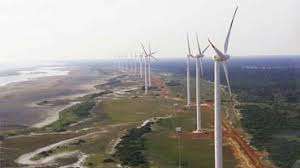Amidst COVID-19 curfew
by TamilNet, May 7, 2020

Photo: http://www.dailymirror.lk/article/Danish-firm-to-construct-Mannar-Wind-Farm-160569.html
Hundreds of Sinhala workers from South and Indian subcontractors are roaming free in Mannaar, between Oalaith-thoduvaay and Thoadda-ve’li, where Tamil villagers are struggling to cope with their livelihood due to COVID-19 curfew. Millionaire investors from the South and the occupying SL State abetted by Asian Development Bank, are not only violating the unanimous and democratic decision of the 21 elected Mannaar Divisional Council against the controversial windmill project, but they also have no concerns about the risk of coronavirus spread in the project area. Naduk-kudaa villagers in Peasaalai protested when the work suddenly resumed in mid-April. Since then, heavy vehicles transporting machinery from Trincomalee have been plying the road. From Thalai-mannaar to Thoadda-ve’li, ten Village (GS) areas of MannaarDivisional Secretariat division are severely affected by the mega project.
The only democratic space left for the people is their elected local council, Piratheasa Chapai, which finds objections being systematically ignored by the SL State and its abettors.
The 21 councillors have jointly opposed the sinister ‘development’ crime.
Initially, the previous council jointly opposed the move when the unitary state mechanism was pushing for the project in 2012-2013 during the regime of then SL President Mahinda Rajapaksa.
However, when the term of the Divisional Council expired, the colonial governor to North instructed the then Commissioner of Local Government in North to get the Assistant Commissioner of Local Government to file necessary papers at the absence of an elected council through the secretary of the Divisional Council.
The local people are opposing the mega project with environmental and resettlement related concerns.
The lands for windmill farm have been deceptively obtained from private owners. The removal of coastal vegetation, including palmyra trees, would cause salination and affect the quality of the underground water, they fear.
Furthermore, the effects of the wind farm creating underwater sound would seriously affect marine life, keeping fish stocks five kilometres away, the fishers argue.
The cattle life would also get affected due to changed land-use.
In the meantime, uprooted people returning to Mannaar have no lands. There are thousands more yet to resettle back from war-time overseas displacement to Tamil Nadu, India.
On top of everything, there is zero inclusion of native institutions, experts and the society in the top-down exploitative mega ‘development’ project.
The Sinhala proponents of the mega-project argue that they need to carry out the scheme disregarding the COVID measures due to deadlines set by the external funders. They also say that specific construction work could not be carried out due to the windy conditions if the project gets delayed.
Ceylon Electricity Board, which comes under the Ministry of Power, Energy and Business Development of the unitary state and private business owners in the South are behind the project with the backing of the Asian Development Bank.
Chronology: